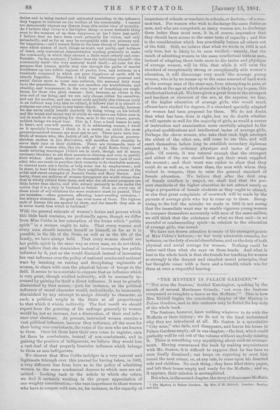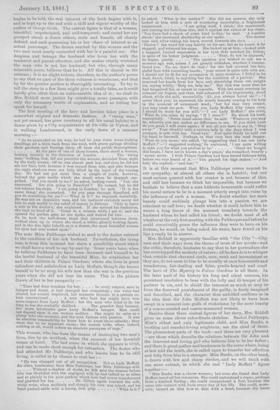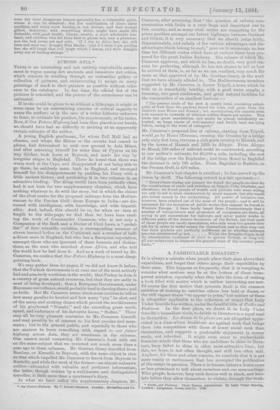"THE MYSTERY IN PALACE GARDENS."*
" Nor even the Seatons,' decided Kensington, speaking by the mouth of several Mesdames Grundy, ' not even the Seatons compassed. so complete a fiasco as the Moffatts.'" This is how Mrs. Riddell begins the concluding chapter of the Mystery in Palace Gardens, and in this sentence may be found the key-note• of the whole book.
The Seatons, however, have nothing whatever to do with the Moffatts or their history ; we do not in the least understand why they are introduced at all. Mr. Seaton is a speculative " City man," who fails, and disappears, and leaves his house in Palace Gardens empty, all in one chapter,—the first, which could perfectly well be cut out of the volume without anybody missing it. There is something very mystifying about such an arrange- ment. Flaying commenced the book by making acquaintance with Mr. Seaton, it is difficult to suppose that he has been so soon finally dismissed ; one keeps on expecting to meet him, round the next corner, or, at any rate, to come upon his deserted wife and children. No such thing ; they have filled thirty pages, and left their house empty and ready for the Moffatts ; and so,. it appears, their mission is accomplished.
But when, in the second chapter, the story of these same Moffatta
'0 The Motery in Palace Gardena, By Mrs. 3. IL Ridden. Loudon: Bentley and Son. begins to be told, the real interest of the book begins with it, and is kept up to the end with a skill and vigour worthy of the author of George Geith. The central figure is that of a woman, beautiful, unprincipled, and evil-tempered; and round her are grouped about a dozen others, male and female, all clearly defined, and each possessing his or her share of interest as an actual personage. The drama enacted by this woman and the two men most nearly connected with her is a painful one. She despises and betrays the husband who loves her with the tenderest and purest affection, and she makes utterly wretched. the man who is not her husband, but who, through many miserable years, believes that he is. All this is dismal in the extreme ; it is no slight tribute, therefore, to the author's power to say that no part of the three volumes is wearisome, and that by far the greater portion is thoroughly interesting. To try to tell the story in a few lines might give a totally false, as it could. hardly give other than an unfavourable idea of it ; we shall do Mrs. Riddell more justice by extrat;:ing some passages, with only the necessary words of explanation, and so letting her speak for herself.
The first meeting of the hero and heroine takes place in a somewhat original and dramatic fashion. A " rising man," not yet named, has gone (contrary to all his usual habits) to a dance given by a City acquaintance at his villa at Upton, and is walking Londonward, in the early dawn of a summer morning :— " As he proceeded on his way, he had to pass some mean-looking dwellings set a little back from the road, with green palings dividing their gardens, and fending them off from the public thoroughfare. . At the gate of one of these houses, there stood a woman, looking intently in the direction of London. The 'rising man,' walking fast, did not perceive the woman, shrouded from sight by the leafy screen, till ho was almost past her, and then he did not sea her face, both because it was turned from him, and also because the night shadows were not fully lifted by the hand of the coming day, He had not got more than a couple of yards, however, beyond the gate inside which she stood, when he stopped, Bur- prised. 'Did you speak to me P' he asked, looking round. Yes,' she answered. Are you going to Stratford P' He turned, but he did not retrace his stops. ' I am going to London,' he said. It is the same thing,' she remarked. As you pass through Stratford, will you do something for me ?'—' What is it ?' he inquired, doubtfully. He was not an impulsive man, and his instincts certainly never led him to rush madly to the relief of beauty in distress. Only to leave a note at the doctor's,' she explained. If she noticed his hesitation, she took no heed of it. Come in a minute, while I get it,' and she
opened the garden gate as she spoke, and waited for him So he took the half-dozen steps that intervened between them, walked close up to whore she stood, a white, ghostly-looking figure, and in the dim light beheld, as in a dream, the most beautiful woman his eyes had ever rested upon."
The note Mira Palthorpe wished to send to the doctor referred to the condition of her sick husband. Nevertheless, the rising man is from this moment her slave, a possibility about which we shall have a word to say by-and-by. Some years later, when he believes Palthorpe to have been drowned and himself to be the lawful husband of the beautiful Mira, he establishes her and their children in Palace Gardens, where she lives in great splendour and satisfaction as Lady Moffatt, though she knows herself to be no more his wife now than she was in the previous years when she did not bear his name. This is the picture drawn of her in her prosperity :— "Time had done wonders for her In every respect, save in temper and heart, it had changed her completely ; her voice had altered, her accent improved, her manners become to a certain ex- tent conventional A. man who heat her might have won some respect from Lady Moffatt ; but the man who tried to do his duty to her she cordially disliked, . . . . The grander they became, the more intolerable grew Lady Moffatt's temper. Man could not depend upon it, nor woman neither. She might be calm as a glassy lake one moment, and the next furious with passion, It was an absolute impossibility to know how to avert these attacks ; they were due to no apparent cause ; the merest trifle, often, indeed, nothing at all, would induce an absolute paroxysm of rage."
This woman, who has been the means of destroying two men's lives, dies by an accident, when the moment of her downfall seems at hand. The last scene in which she appears is vivid, and can be made short enough for extraction. The doctor who had attended Mr. Palthorpe, and who knows him to be still living, is called. in by chance to visit her :— "Ile was changed out of all recognition. Not so Lady Moffatt. An older, handsomer, finer Mira Palthorpe, but Mira Palthorpe still. Withont a shadow of doubt, ho felt sure the woman before him was identified with the negligent wife he had talked to so often and so plainly in the poor parlour which love had never transformed and glorified for her Dr. Hilton again touched the soft, white wrist, when suddenly and sharply his own was seized, and his hand pushed aside with a strong, firm grip 'What is it P' he asked. What is tho matter ?' She did not answer, she only looked at him with a sort of wondering incredulity, a frightened amazement I am going mad, I think,' she murmured, and turning her face from him, laid it against the velvet of her chair. You have had a shock of some kind to-day,' he said. ' A horrible shock,' she answered, shuddering as she spoke The doctor rose and, after taking his leave, moved towards the door ' Doctor the word fell very faintly on his ear, but as ho hoard it ho stopped, and retraced his steps. She looked up at him,—looked with a haggard, hunted expression in her eyes that touched Dr. Hilton) in spite of his better judgment Pray, do not be alarmed,' he began, gently The question you wished to ask me a moment ago was, unless I am greatly mistaken, whether I remem- bered you. No, no, don't do that ;' for she had covered her fair; sinful face with trembling hands ; your secret is quite safe with me.. I should not be fit for my occupation if, upon occasion, I failed to be deaf, dumb, blind, to anything but the condition of a patient.' She removed her hands from her face, and, stretching them out, caught his, crying wildly, ' Help me, help me !' But this was more than he had bargained for, or meant to concede. With but scant courtesy he released his angers, and then, half-ashamed of his impetuosity, stood
silent, while she said, mournfully, Ah, you always hated me I never liked you,' he answered, his sturdy honesty coming to his help in the moment of extremest need ; but for that very reason, you may trust one now. Were you Lady Moffatt fifty times over, I should be sorry for you still.'—' I am Lady Moffatt I' she cried, What do you mean by saying, " If I were ?" He shook his head, sorrowfully. ' Never mind about that,' he said. Whatever you may be, whoever you are, makes no difference to me. If you think I can do you good, I will come again ; if not, all yon have to say is, " Stay away." Your identity with a certain lady in the days when I was younger, is safe with me. Good-bye.' And quite freely he held out his hand in farewell. Perhaps, in that very fact she read danger. What do you moan,' she asked, by suggesting that I am not Lady
Moffatt ?'—' I suggested nothing,' he answered, am quite willing
to take you for what you profess to be. Since we bought this house, I have never known a day's peace,' she remarked, wearily ; ' never, never. I wish Palace Gardens had been buried fathoms deep,
before we over heard of You played for high stakes.'—' And lost,' she replied,—' and lost.' "
It is at this moment that Mira Palthorpe comes nearest to our sympathy, at almost all others she is hateful; but our most serious quarrel with her creator is not because of this, and still less because we think her impossible, but because we hesitate to believe that a man hitherto honourable could suffer
his moral nature to be in a moment utterly swept into ruins by the influence of such a woman. We doubt whether her mere beauty could suddenly plunge him into a passion we are reluctant to call love ; we doubt whether it could induce him to weave a long tissue of the meanest treachery towards the husband whom he had called his friend ; we doubt most of all whether at the very first meeting with the Palthorpes and before he could conceivably guess the influence they were to have on his fortune, he would, on being asked his name, have found on his
lips a ready lie in answer.
Mrs. Riddell is apparently familiar with " the City "—City men and their ways form the theme of most of her novels—and the critic, therefore, hesitates to say that in her portraiture she has overstepped the modesty of nature ; all he dare do is to whisper that, outside that charmed circle, men, weak and inconsistent as they are, do not seem to him to be usually at once honourable and treacherous, fair-dealing and false, gentle-hearted and cruel The hero of The Mystery in Palace Gardens is all these. In
the later part of his history his long and silent remorse, his
persistent resolution to bear with the folly and ill-temper of hie partner in sin, and to shield the innocent as much as may be' from the deserved punishment of the guilty, is finely imagined and described, and the character thus unfolded confirms us in the idea that Sir John Moffatt was not likely to have been swept iu a moment into gulfs of wickedness by the mere beauty of a coarse-minded and coarse-mannered woman.
Besides these three central figures of her story, Mrs. Riddell gives us some clever subordinate sketches. Rachel Palthorpe,. Mira's eldest and only legitimate child, and Miss Banks, a bustling and scandal-loving neighbour, are the chief of these.. The pleasantest parts of the book—and these are very pleasant.
—are those which describe the relations between Sir John and the innocent and loving girl who believes him to be her father ; and there is great pathos and tenderness in the scene where, being at last told the truth, she is called upon to transfer her affection, and duty from him to a stranger. Miss Banks, on the other band, is drawn with few and sharp strokes, and we will finish with
One more extract, in which she and " Lady Moffatt" figure tog ether :-
"Miss Banks was a clover woman ; but even she found that Lady Moffatt taxed all her resources. She could understand a rogue, perhaps. from a kindred feeling ; she could comprehend a fool, because she came into contact with fools every day of her lifo. She could, more-. over, hazard an idea how to deal with a fiend, because she knew- even the most dangerous temper generally has a vulnerable point, where it can be attacked ; but the combination of these three qualities, and many more besides, in one woman, and that woman gifted, moreover, with everything which might have made life desirable, with good health, beauty, wealth, a most admirable hus- band, and children who did their best to please her, was a phenome- non she had never yet met with. 'If I try to drive her, she will turn and rend rue,' thought Alias Banks; and if I show I am guiding her, she will laugh that evil laugh which I detest, and walk straight away out of leading-strings.' "




































 Previous page
Previous page